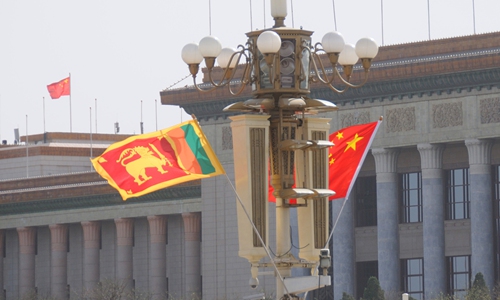HOME >> OPINION
Sri Lanka has to strike balance in China ties
Source:Global Times Published: 2019/12/3 22:48:40

Photo: IC
Sri Lanka's new President Gotabaya Rajapaksa arrived in India on Thursday, in his first foreign visit after taking office.In an interview with Strategic News International on November 26, Rajapaksa said that Sri Lanka will not do anything that will harm India's security interests, and the country hopes to remain neutral in matters involving international powers. He also said he would request China to renegotiate the Hambantota Port, which the Sri Lankan government leased to a Chinese company for 99 years, adding that the agreement was "a mistake." India and the US have always pointed an accusing finger at the 99-year lease.
Rajapaksa's recent statement may be his strategy to make it look that he is not as pro-China as media have described, to ease India's geopolitical concerns. He may also need to show his disapproval of Sri Lanka's former government's policies. Besides, it is possible that Rajapaksa was only making a statement on the specific agreement and hoping to negotiate with China for an adjustment. Generally, China-Sri Lanka strategic cooperation is reciprocal, and the two countries can negotiate the specific projects on the basis of legal contracts and cooperation.
China and Sri Lanka share traditional friendship and their relations have overcome the test of time. In recent years, the two countries have worked together on development strategies and deepened cooperation under the framework of the China-proposed Belt and Road Initiative (BRI), bringing benefits to the people of the two countries. Rajapaksa has long been pragmatic and friendly toward China. He used to visit China in 2009 as secretary of the country's ministry of defense during the administration of his elder brother, former president Mahinda Rajapaksa, to promote China-Sri Lanka relations.
However, some Western media outlets have been hyping up China's presence in Sri Lanka. They say India regards China as a threat because the latter wants to gain strategic foothold in Sri Lanka - India's so-called backyard.
Such rhetoric reflects the crooked mind-set of some Western media outlets. China's assistance to Sri Lanka does not have any political conditions attached. It serves and benefits Sri Lanka's entire population. Sri Lanka has responded many times to the so-called China debt trap diplomacy. For example, Mahinda Rajapaksa released a statement in January 2018, saying that "there was never any Chinese debt trap as alleged."
Sri Lanka is located at a crucial point in the Indo-Pacific region, and regarded by the US as a valued friend. In fact, Washington regards all South Asian countries an essential part of its Indo-Pacific Strategy. In the Indo-Pacific Strategy Report, published by the US Department of Defense on June 1, the US stated clearly that it "seeks opportunities to broaden and strengthen partnerships" with Sri Lanka and several other South Asian countries "to respond to shared regional challenges."
On November 4, the US Department of State released a report titled "A Free and Open Indo-Pacific: Advancing a Shared Vision," saying the US is helping Sri Lanka, Bangladesh and Maldives "equip and train their navies and coast guards to safeguard strategic sea lines of communication."
China does not object to the development of cooperative relations between the US and other countries. However, some US steps in the guise of a response to the so-called China threat theory aim at affecting China's overseas security interests and interfering in the BRI. China is firmly opposed to such moves.
Sri Lanka has an important strategic position in the Indian Ocean, and its significance is increasingly valued by major countries. It will be the new government's strategic choice to strike a diplomatic balance and avoid being involved in the conflicts between great powers. Meanwhile, in the long run, people of Sri Lanka will find out which country is sincere in bringing them benefits, and which country wants to interfere in Sri Lanka's internal affairs.
The article was compiled by Global Times reporter Li Qingqing based on an interview with Qian Feng, research fellow at the National Strategy Institute of Tsinghua University. liqingqing@globaltimes.com.cn
RELATED ARTICLES:
Posted in: ASIAN REVIEW